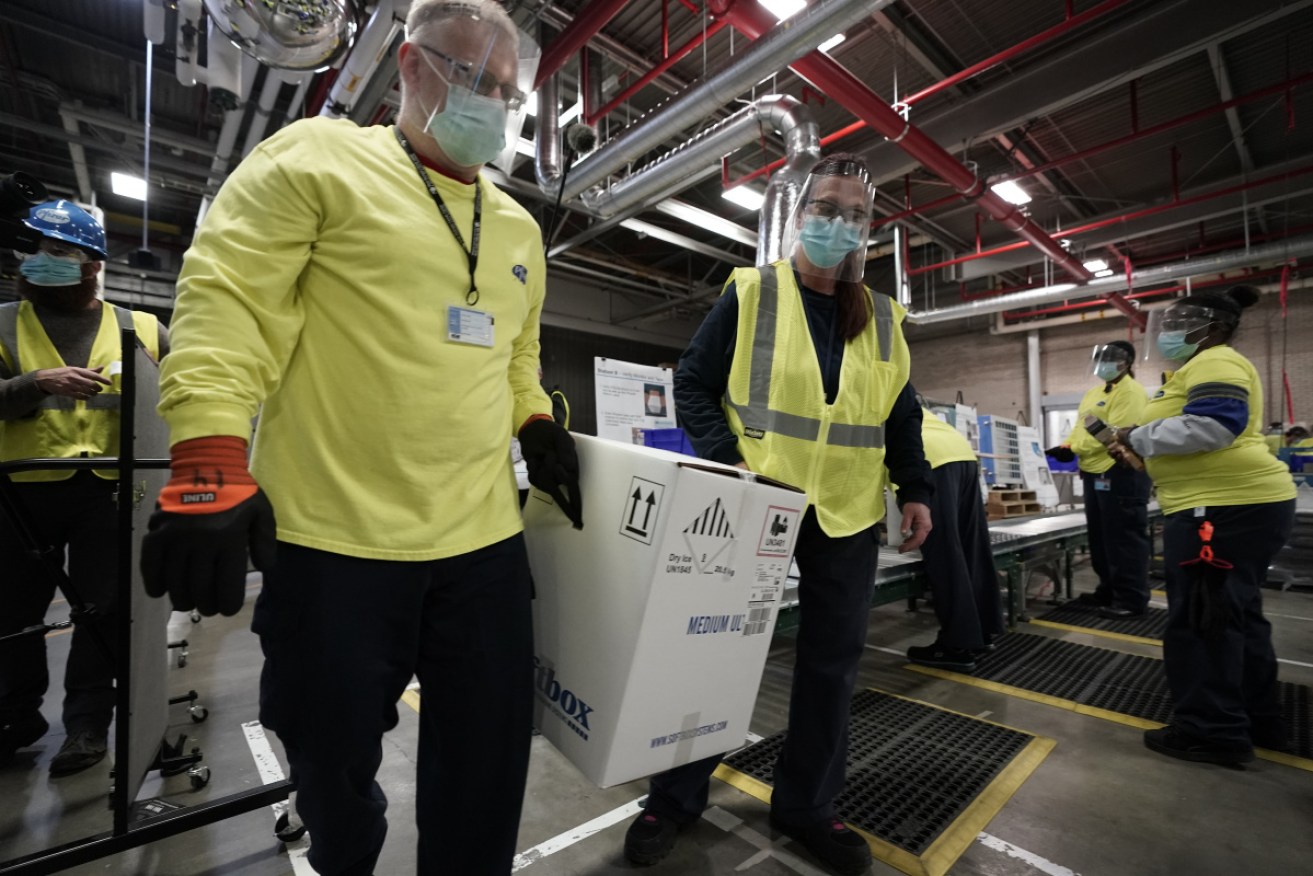Australia’s COVID-19 vaccine supply under threat as global race heats up


Boxes of the Pfizer-BioNTech COVID-19 vaccine are prepared for shipment in Michigan. Photo: Getty
Coronavirus vaccine giants Pfizer and AstraZeneca are set to face a grilling from politicians on Thursday amid concerns Australia’s rollout could be delayed or impacted .
Australia could receive just 7.5 million of its promised 10 million doses of the Pfizer/BioNTech vaccine as storage issues and worsening political tensions threaten global supply.
The potential loss in doses means 1.2 million Aussies may miss out on the jab when the rollout is due to start next month, which could now be delayed.
The Senate’s coronavirus response committee will on Thursday hear from two of the companies the federal government has struck a deal with for a combined 63.8 million vaccine doses.
The alarm was raised on Wednesday after the European Union slapped export controls on vaccines produced within the bloc in response to Pfizer and AstraZeneca admitting they could no longer meet their pre-agreed supply volumes and timeline.
Under the EU’s new system, all vaccine producers will have to ask for permission before sending vials outside the region to make sure there is enough to accommodate Europe first.

European Commission President Ursula von der Leyen. Photo: Getty
Although Australia plans to produce the AstraZeneca vaccine at a Melbourne factory owned by biopharmaceutical firm CSL, the 10 million doses it has agreed to buy from Pfizer will be manufactured in Belgium.
The Pfizer vaccine is the only one granted approval for use in Australia to date, and will roll out late next month.
Associate Professor Adam Kamradt-Scott, a global health security expert at The University of Sydney, said the export restrictions were a “curveball” that increased strain on existing production and manufacturing issues, as well as global shortages.
“If there are restrictions on exports, it could delay the arrival of our vaccines that the Australian government has pledged to start rolling out in February,” he said.
But potential delays are not the only problem.
Given Pfizer’s vaccine must be kept at minus 70 degrees Celsius, it’s likely we will lose some doses while transporting the vials all the way to Australia, Associate Professor Scott said.
“If the vaccines are left on the tarmac as they’re loaded into planes, even for a short period of time, it could compromise those vaccines,” he told TND.
The French government has already warned its citizens that up to 30 per cent of its supply of the vaccine could be wasted as a result of these transport and storage challenges.
“Australia has to anticipate this potential issue as well,” Associate Professor Scott said.
“Even though we’ve ordered 10 million doses of Pfizer, and even if we were able to achieve France’s statistics where they’ve estimated between 25 to 30 per cent of cold chain storage loss, that’ll bring ours down to 7.5 million.”
Speaking to reporters on Wednesday, chief medical officer Paul Kelly said the timeline of the Pfizer/BioNTech rollout in February had not changed.
“At the moment the advice from Pfizer is that we are still expecting the initial doses of the Pfizer vaccine to be coming into Australia in the latter part of February and we expect the vaccination of people in Australia with that Pfizer vaccine to still commence late in February,” he said in Canberra.
“So at the moment, we don’t have any concerns about the supply that Pfizer has coming into Australia.”
Where is Australia at with COVID-19 vaccines?

Despite its logistical shortcomings, the Pfizer/BioNTech vaccine looks set to be the first one ready for rollout in Australia in late February.
In a significant step forward on Monday, the vaccine was approved by the Therapeutic Goods Administration (TGA) for people 16 years and older.
This vaccine requires two doses, 21 days apart.
Australia has ordered 10 million doses.
The first groups in line to receive it include aged care and disability care residents and workers, frontline health care workers and quarantine and border workers.

The University of Oxford/AstraZeneca vaccine is one of the most progressed COVID-19 vaccines in development globally, but we are still waiting for TGA approval in Australia.
So far, we have secured 53.8 million doses of this vaccine, with 3.8 million doses due to be delivered in early 2021.
Biopharmaceutical company CSL will manufacture the remaining 50 million doses in Melbourne in monthly batches.

The Novavax vaccine is promising, but has not progressed as far the Pfizer/BioNTech and Oxford/AstraZeneca vaccines.
If the TGA approves it, the vaccine will be available in Australia as early as the first half of 2021.
It is expected that 51 million doses will be made available in Australia during 2021, which will supply enough doses to cover Australia’s whole population.
Doses for Australia will be manufactured in Europe.








